
The First Epistle to the Thessalonians is a Pauline epistle of the New Testament of the Christian Bible. The epistle is attributed to Paul the Apostle, and is addressed to the church in Thessalonica, in modern-day Greece. It is likely among the first of Paul's letters, probably written by the end of AD 52, in the reign of Claudius although some scholars believe the Epistle to the Galatians may have been written by AD 48. The original language is Koine Greek.
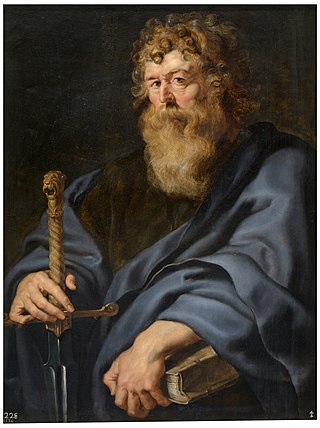
Paul, commonly known as Paul the Apostle and Saint Paul, was a Christian apostle who spread the teachings of Jesus in the first-century world. For his contributions towards the New Testament, he is generally regarded as one of the most important figures of the Apostolic Age, and he also founded several Christian communities in Asia Minor and Europe from the mid-40s to the mid-50s AD.
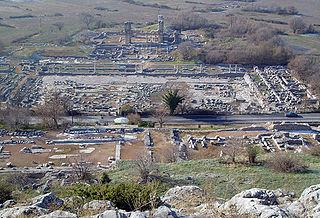
Philippi was a major Greek city northwest of the nearby island, Thasos. Its original name was Crenides after its establishment by Thasian colonists in 360/359 BC. The city was renamed by Philip II of Macedon in 356 BC and abandoned in the 14th century after the Ottoman conquest. The present village of Filippoi is located near the ruins of the ancient city and is part of the region of East Macedonia and Thrace in Kavala, Greece. The archaeological site was classified as a UNESCO World Heritage Site in 2016 because of its exceptional Roman architecture, its urban layout as a smaller reflection of Rome itself, and its importance in early Christianity.

Timothy or Timothy of Ephesus was an early Christian evangelist and the first Christian bishop of Ephesus, who tradition relates died around the year AD 97.
Trophimus or Trophimus the Ephesian was a Christian who accompanied Paul during a part of his third missionary journey. He was with Paul in Jerusalem, and the Jews, supposing that the apostle had brought him into the temple, raised a tumult which resulted in Paul's imprisonment.. In writing to Timothy, the apostle comments that he left Trophimus in Miletus due to illness. This must refer to some event not noticed in the Acts.

Silas or Silvanus was a leading member of the Early Christian community, who according to the New Testament accompanied Paul the Apostle on his second missionary journey.
An apostolic see is an episcopal see whose foundation is attributed to one or more of the apostles of Jesus or to one of their close associates. In Catholicism, the phrase "The Apostolic See" when capitalized refers specifically to the See of Rome.
In ancient times, the Bereans were the inhabitants of the city of Berea, also referred to as Beroea in the Bible. Today, the city is known as Veria in what is today northern Greece. The name has been taken up by certain groups within Protestantism based on the Bereans' emphasis on apologetics and studying Scripture.
Sopater was the son of Pyrhus, a man from the city of Berea, mentioned in Acts 20:4. Sopater and others accompanied Paul out of Macedonia after a group of Jews began to plot against Paul, and then sailed from Philippi to Alexandria Troas where they met Paul who had gone by land.
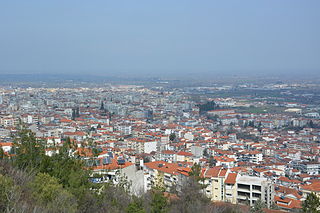
Veria, officially transliterated Veroia, historically also spelled Berea or Berœa, is a city in Central Macedonia, in the geographic region of Macedonia, northern Greece, capital of the regional unit of Imathia. It is located 511 kilometres north-northwest of the capital Athens and 73 km (45 mi) west-southwest of Thessaloniki.
Jason of Thessalonica was a Jewish convert and early Christian believer mentioned in the New Testament in Acts 17:5–9 and Romans 16:21.
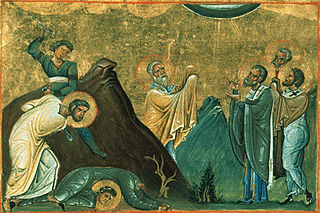
Sosipater is a person mentioned in the New Testament, in Romans 16:21. He is probably the same person as Sopater mentioned in Acts 20:4.

The following outline is provided as an overview of and topical guide to Christianity:
Early Christianity, otherwise called the Early Church or Paleo-Christianity, describes the historical era of the Christian religion up to the First Council of Nicaea in 325. Christianity spread from the Levant, across the Roman Empire, and beyond. Originally, this progression was closely connected to already established Jewish centers in the Holy Land and the Jewish diaspora throughout the Eastern Mediterranean. The first followers of Christianity were Jews who had converted to the faith, i.e. Jewish Christians. Early Christianity contains the Apostolic Age and is followed by, and substantially overlaps with, the Patristic era.

The Areopagus sermon refers to a sermon delivered by Apostle Paul in Athens, at the Areopagus, and recounted in Acts 17:16–34. The Areopagus sermon is the most dramatic and most fully-reported speech of the missionary career of Saint Paul and followed a shorter address in Lystra recorded in Acts 14:15–17.

Acts 17 is the seventeenth chapter of the Acts of the Apostles in the New Testament of the Christian Bible. It records the second missionary journey of Paul, together with Silas and Timothy. The book containing this chapter is anonymous, but early Christian tradition uniformly affirmed that Luke composed this book as well as the Gospel of Luke.
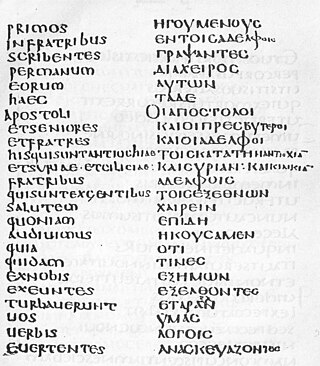
Acts 16 is the sixteenth chapter of the Acts of the Apostles in the New Testament of the Christian Bible. It records the second missionary journey of Paul, together with Silas and Timothy. The book containing this chapter is anonymous but early Christian tradition uniformly affirmed that Luke composed this book as well as the Gospel of Luke.

Acts 19 is the nineteenth chapter of the Acts of the Apostles in the New Testament of the Christian Bible. It records part of the third missionary journey of Paul. The author of the book containing this chapter is anonymous but early Christian tradition uniformly affirmed that Luke composed this book as well as the Gospel of Luke.
Acts 20 is the twentieth chapter of the Acts of the Apostles in the Christian New Testament of the Bible. It records the third missionary journey of Paul the Apostle. The book containing this chapter is anonymous, but early Christian tradition uniformly affirmed that Luke the Evangelist composed this book as well as the Gospel of Luke.












